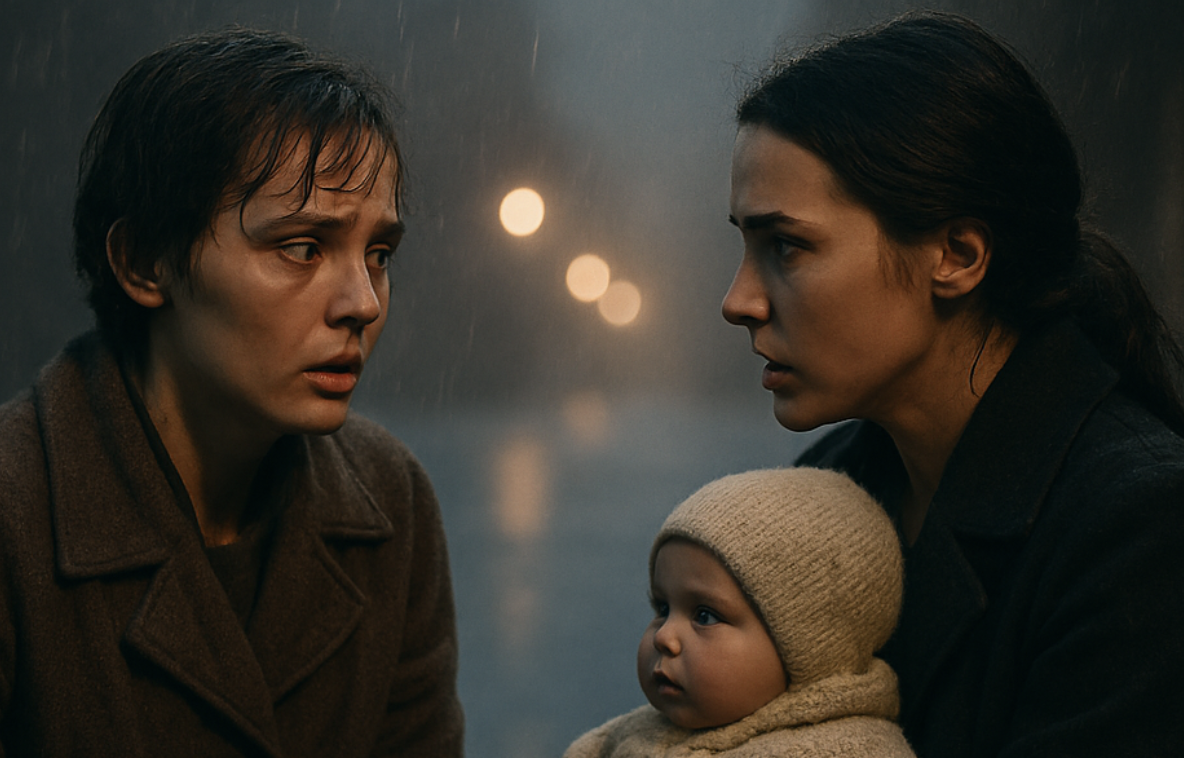“Take him, I beg you!” The woman practically shoved a worn leather suitcase into my hands and pushed the little boy toward me.
I almost dropped the bag with food—I was bringing treats from the city to our village neighbors.
“Sorry, what? I don’t know you…”
“His name is Misha. He’s three and a half.” The woman grabbed my sleeve; her knuckles turned white. “In the suitcase… there’s everything he needs. Don’t leave him, please!”
The little boy pressed against my leg. He looked up at me with huge brown eyes, his blonde curls messy, a scratch on his cheek.
“You can’t be serious!” I tried to pull away, but the woman was already pushing us toward the train car.
“You can’t just do this out of the blue! The police, child services…”
“There’s no time to explain!” Her voice trembled with desperation. “I have no choice, do you understand? None at all!”
A crowd of dacha residents caught us and pushed us into the crowded carriage. I looked back—the woman stayed on the platform, hands pressed to her face. Tears streamed down her fingers.
“Mom!” Misha made a move toward the door, but I held him back.
The train started moving. The woman grew smaller and smaller until she disappeared into the evening dusk.
We somehow settled on a bench. The boy cuddled up to me and sniffled into my sleeve. The suitcase pulled my arm down—it was heavy. What was in there, bricks?
“Auntie, will Mom come?”
“She will come, little one. She definitely will.”
The fellow passengers looked over with curiosity. A young woman with a strange child and a shabby suitcase—a sight, to be honest, unusual.
All the way, I kept thinking: What kind of craziness is this? Maybe some prank? But what kind of prank—the child was real, warm, smelled of baby shampoo and cookies.
Peter was stacking firewood in the yard. When he saw me with the kid, he froze, holding a log.
“Masha, where’s he from?”
“Not where from, who. Meet Misha.”
I told him everything while cooking semolina for the boy. My husband listened, frowned, rubbed the bridge of his nose—a sure sign he was thinking hard.
“We need to call the police. Immediately.”
“Peter, what police? What will I tell them—someone gave me a kid at the station like a puppy?”
“So what do you suggest?”
Misha was devouring the porridge, smearing it over his chin. He was very hungry but tried to eat neatly, holding the spoon correctly. A well-mannered boy.
“Let’s at least see what’s in the suitcase,” I nodded toward it.
We sat Misha in front of the TV and turned on “Nu, pogodi!” The suitcase clicked open.
I caught my breath. Money. Stacks and stacks of cash, tied with bank bands.
“My God,” Peter exhaled.
I grabbed a bundle at random. Five-thousand ruble notes, a hundred bills. I estimated—there were about thirty such bundles, no less.
“Fifteen million,” I whispered.
“Peter, that’s a fortune.”
We looked at each other—and at the boy laughing, watching the wolf chase the hare.
Nikolai, Peter’s old friend, found a way out. He came a week later, we drank tea and talked.
“You can register him as an abandoned child,” he said, scratching his bald head. “Like found at the gate. A friend works at child services, will help with documents.”
Though… it will require some… organizational expenses.
By that time, Misha was already settling in. He slept in our room on Peter’s old folding bed, ate oatmeal with jam for breakfast, followed me around the household like a tail.
He gave names to the chickens—Pestrushka, Chernushka, Belyanka. Only at night did he sometimes whimper, calling for Mom.
“What if his real parents are found?” I doubted.
“If they’re found, so be it. But for now, the boy needs a roof over his head, hot food.”
The paperwork was done in three weeks. Mikhail Petrovich Berezin—officially our foster son. We told the neighbors he was a nephew from the city; his parents died in an accident. We handled the money carefully. First, we bought Misha clothes—his old things, though good quality, were too small. Then books, construction toys, a scooter.
Peter insisted on repairs—the roof was leaking, the stove smoked.
“For the boy,” he grumbled, nailing down shingles. “So he doesn’t catch a cold.”
Misha grew like yeast. At four, he knew all the letters; at five, he was reading and subtracting. Our teacher, Anna Ivanovna, exclaimed: “You’re raising a prodigy! He should study in the city, in a special school.”
But we were wary of the city. What if someone recognized him? What if that woman changed her mind and was looking?
By seven, we decided—he went to the city gymnasium. We drove him back and forth; thankfully, we had enough for a car. Teachers couldn’t praise enough:
“Your son has a photographic memory!” the math teacher exclaimed.
“And his pronunciation!” the English teacher added. “Like a native Brit!”
At home, Misha helped Peter in the workshop. My husband started woodworking, making custom furniture. The boy could spend hours with a plane, carving wooden animals.
“Dad, why do all the other kids have grandmothers, but I don’t?” he once asked at dinner.
Peter and I exchanged glances. We had expected this question and prepared for it.
“They passed away long ago, son. Before you were born.”
He nodded seriously and asked no more. But I saw he thought sometimes, looking closely at our photos.
At fourteen, he won first place at the regional physics Olympiad. At sixteen, professors from Moscow State University came to persuade him to enroll in preparatory courses. They said: prodigy, future of science, a Nobel Prize winner.
But I looked at him and saw that scared little boy from the station. Frightened but trusting. I wondered—was his mother alive? Did she remember him?
The money was melting away. For studies, tutors, trips. We also bought a nice city apartment for him to live and study. The rest—about three million—was deposited in an account for university.
“You know,” Misha said on his eighteenth birthday, “I love you both very much. Thank you for everything.”
We hugged tightly then. A family is a family, even if it all started wildly.
A letter came exactly a year later. A thick envelope with no return address, inside handwritten pages and an old photo.
“To me?” Misha wondered, looking at the address. “I wonder from whom?”
He read silently for a long time. His face changed—pale, then flushed. I couldn’t stand it, peered over his shoulder.
“Dear Misha, if this letter has reached you, it means I am no longer in this world. Forgive me for leaving you then, on the platform. I had no choice—your father died, and his partners decided to take over our business. They wouldn’t have stopped at anything, even… I can’t write what threats they made. I watched the station for a long time, choosing. That woman seemed kind to me—a plain face, tired eyes, a wedding ring. And bags from the city—meaning she was going to the village, where it’s calmer. Your father, Mikhail Andreevich Lebedev, owned the investment fund ‘Lebedev-Capital.’ When he passed, I tried to hold the company, but your father’s partners started a real battle. Lawsuits, threats. Then they said—either I disappear, or something happens to you. I chose your life. I faked my death and left. All these years, I watched from afar—hiring people to send photos and reports on your progress. You grew into a wonderful person. Your foster parents are saintly people, may God bless them. Now those people are gone—their karma caught up. You can claim what belongs to you—52% of the fund’s shares, a huge amount of money. Find lawyer Igor Semenovich Kravtsov, firm ‘Kravtsov and Partners.’ He knows everything and is waiting for you. Forgive me, son. I loved you every day, every hour of our separation. Maybe someday you’ll understand and forgive me. Your mother, Elena.”
Attached was a photo—a young woman with a sad smile hugging a blond toddler. The same one from the platform. Only younger, happier.
Misha put the papers down. His hands trembled slightly.
“I suspected,” he said quietly. “Always felt something was wrong. But you became family to me. Real parents.”
“Mishenka…” I had a lump in my throat.
“That’s some inheritance,” Peter whistled. “No kidding.”
Misha stood, came to us, hugged tightly, like in childhood when there was a storm.
“You raised me. Took care of me. Spent your last. If anything comes, we split it three ways, period. You are my family. Real family.”
A month and a half later, the lawyer confirmed—Mikhail Lebedev really was the main shareholder of the huge fund. Former partners of the father sued and threatened, but all their claims were dismissed.
“Mom was right,” Misha said at the celebratory dinner. “On that entire station, she chose the best people. Who weren’t afraid to take in a stranger boy with a suitcase of money.”
“What stranger?” Peter objected. “Our own!”
And we hugged again. A strong family, created not by genes but by love—and a desperate act of a woman on a twilight platform.
“I won’t let that money be divided among three,” lawyer Kravtsov cut in, adjusting his glasses. “Mikhail Andreevich, you are an adult, but such sums… the tax office will be interested.”
We sat in his office—me, Peter, and Misha. Outside the window, a Moscow street buzzed, and we couldn’t believe the reality of what was happening.
“And what about my parents?” Misha leaned forward. “They should get their share.”
“There are options,” Kravtsov pulled out a folder. “You can make them consultants of the fund with a salary. Or transfer shares gradually. Or buy real estate in their name.”
“Let’s do it all at once,” Peter smirked. “Consultants, real estate, and shares later.”
We went home silently. Each thought of his own. I—how our quiet village life would change.
Peter—about his workshop, which could now be expanded. And Misha… he stared out the train window as if saying goodbye to the past.
The first changes began a month later. Some people in expensive suits came to the village, walking the streets, photographing our house.
“Journalists,” our neighbor Klavdiya guessed. “They smelled out your wealth.”
We had to hire security. Two strong guys now stood guard by the gate, checking all arrivals. The villagers first sneered but then got used to it.
“Mom, maybe we should move?” Misha suggested at dinner. “To the city, closer to the office.”
“And what about the household? Chickens, garden?”
“We can buy a house in the suburbs. With a yard.”
Peter poked his cutlet silently. I knew he didn’t want to leave. His workshop was here, established customer connections, friends.
“Let’s live here for now,” I said. “Then we’ll see.”
But we couldn’t live in peace. Journalists climbed over the fence, some ‘partners’ called with offers. And then the thing we feared happened.
“Mikhail Andreevich?” A woman about fifty in a mink coat stood at the door. “I’m your aunt, Larisa Sergeevna. Your father’s sister.”
Misha froze. In all these years, no living soul had looked for him, and suddenly—relatives.
“I have no aunts,” he said coldly.
“Oh, come on!” The woman rummaged in her purse, pulling out yellowed photos. “Look. This is me with your dad, about twenty years old.”
In the photo, indeed two young people, and the man looked like Misha—the same cheekbones, same eye shape.
“What do you want?” Peter stood behind Misha.
“What do you think?” the aunt huffed. “I’m blood! I searched for my nephew all these years, couldn’t find peace!”
“Sixteen years and no luck,” I muttered.
The woman threw up her hands:
“But Elena deceived everyone! She said the child was gone long ago! We believed, mourned… Then I read in the papers—the heir Lebedev appeared! My heart told me—this is my Misha!”
Misha silently turned and went into the house. The three of us stayed.
“Leave,” Peter said firmly. “Where were you when the boy cried at night? When he had angina in the hospital? When he went to Olympiads?”
“I didn’t know!”
“Now you know. When the money showed up. Convenient.”
The aunt left but came back the next day with a lawyer. Then some other ‘relatives’ showed up—cousins, nephews. All with photos, all with proof of kinship.
“We’re moving,” Misha decided after the next visit. “We’ll find a house in a gated community near Moscow. We can’t live here anymore.”
Peter surprisingly agreed:
“I’ll open a workshop there. More orders in the capital.”
The move took two months. We found a great house—three floors, a hectare of land, an hour from Moscow. Peter immediately claimed the outbuilding for the workshop, I chose a spot for greenhouses.
“Chickens?” I asked Misha.
“Of course, Mom. Whatever you want.”
Life in the new house was different. Misha went to the office, got involved in fund affairs. It turned out he had real talent for investments—increased capitalization by twenty percent over time.
“Genes,” Kravtsov said. “Your father was a genius financier too.”
Peter opened a furniture factory. First small, about twenty people. Then expanded—exclusive handmade furniture was in high demand. And me… I just made our new house cozy. Planted a garden, a rose garden. Got decorative chickens with crests. In the evenings, we gathered on the veranda, drank tea, talked.
“You know,” Misha said once, “I want to find Mom’s grave. The real mom. To lay flowers and say thank you.”
“That’s right,” Peter nodded. “We have to.”
We found the grave in a small town by a lake. We went there together. On the gray stone was a simple inscription: “Elena Lebedeva. Loving Mother.”
Misha stood silently for a long time, then laid a bouquet of white roses.
“Thank you,” he said quietly. “For choosing to trust me to them.”
We flew back in silence. The circle closed—the boy from the station became who he was meant to be. But he remained our son.
“Listen,” Misha turned to us on the plane. “Let’s create a fund? For orphaned children. So everyone has a chance at a family.”
“Let’s,” I smiled. “Call it ‘Platform of Hope’?”
“Exactly!” Misha blossomed. “And the first contribution—the money from the suitcase. Well, what’s left.”
Peter chuckled:
“The whole suitcase went on you, fool. For the apartment.”
“Then we’ll fill a new suitcase. And not just one.”
So that’s how we live now. A big house, a successful business, a charity fund. But most importantly—we stayed a family.
The very one that started with a strange meeting on a train platform.
Sometimes I think—what if I had been scared then? Hadn’t taken Misha? But my heart tells me—everything happened as it was meant to.
That woman on the platform didn’t make a mistake in her choice. And we didn’t make a mistake opening our doors to a stranger child.
Who became the dearest in the world.


